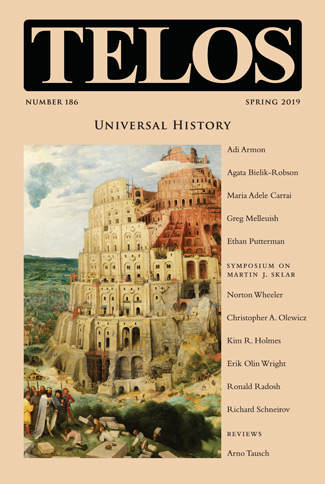In today’s episode of the Telos Press Podcast, David Pan talks with Eric Hendriks-Kim about his article “The Polemics of China’s Counter Cosmopolitanism,” from Telos 201 (Winter 2022). An excerpt of the article appears here. In their conversation they discuss the impetus behind the current proliferation of Chinese theories of cosmopolitanism; how these new ideas about cosmopolitanism fit into a history of anti-Western forms of universalism in various parts of the world; the idea of tianxia, its meaning and history, and how it is used today; how Jiang Shigong’s idea of socialism with Chinese characteristics differs from the theories based on the idea of tianxia; how Jin Huimin conceives of the relationship between universalism and particularity; the relationship of these Chinese notions of cosmopolitanism to Western notions of cosmopolitanism; and whether any of these conceptions escape from an imperialist perspective. If your university has an online subscription to Telos, you can read the full article at the Telos Online website. For non-subscribers, learn how your university can begin a subscription to Telos at our library recommendation page. Print copies of Telos 201 are available for purchase in our online store.
|
By Telos Press · Monday, March 20, 2023 By Telos Press · Thursday, November 19, 2020 In today’s episode of the Telos Press Podcast, Camelia Raghinaru talks with John Milbank about his article “In Triplicate: Britain after Brexit; the World after Coronavirus; Retrospect and Prospect,” from Telos 191 (Summer 2020). An excerpt of the article appears here. If your university has an online subscription to Telos, you can read the full article at the Telos Online website. For non-subscribers, learn how your university can begin a subscription to Telos at our library recommendation page. Purchase a print copy of Telos 191 in our online store. Topics: Brexit, class, coronavirus, culture, economy, Europe, John Milbank, liberalism, nationalism, podcast, post-liberalism, socialism, Telos 191, United Kingdom By Erik Olin Wright · Thursday, May 9, 2019 Erik Olin Wright’s “Martin Sklar’s Theory of Capitalism and Socialism” appears in Telos 186 (Spring 2019). Read the full article at the Telos Online website, or purchase a print copy of the issue in our online store. Individual subscriptions to Telos are available in both print and online formats. Topics: capitalism, Martin J. Sklar, political theory, politics, progressivism, realism, socialism, Telos 186 By Kim R. Holmes · Wednesday, May 1, 2019 Kim R. Holmes’s “A Man between Two Worlds: Assessing Martin Sklar’s Philosophy of Liberalism” appears in Telos 186 (Spring 2019), as part of a symposium on Martin J. Sklar. Read the full article at the Telos Online website, or purchase a print copy of the issue in our online store. Individual subscriptions to Telos are available in both print and online formats. By David Pan · Monday, March 18, 2019 Telos 186 (Spring 2019) is now available for purchase in our store. Individual subscriptions to Telos are also available in both print and online formats. By Aleksandr Shchipkov · Monday, October 2, 2017 The following paper was presented at the conference “After the End of Revolution: Constitutional Order amid the Crisis of Democracy,” co-organized by the Telos-Paul Piccone Institute and the National Research University Higher School of Economics, September 1–2, 2017, Moscow. For additional details about the conference as well as other upcoming events, please visit the Telos-Paul Piccone Institute website. Today is the time when we get to discuss our future together. This is a rare occasion that may or may not occur every hundred years. For once, we now have Russians, Americans, and Europeans sitting in one boat and considering together how to pass the rapids without capsizing. Steering out of the impasse where we have been driven by the global crisis requires clear thinking and direct, candid dialogue, i.e., the return to the “direct statement” culture. And this is exactly the way in which I will take the liberty to speak. I term the manner of speaking plainly in scientific discussions as “intellectual diplomacy.” And there are times when it is capable of achieving greater results than the combined efforts of the foreign ministries of a number of countries of the world. |
Current IssueSubscribe to TelosNow Available!Recent Posts
TELOSscope Archives |
|||
Telos Press Publishing · PO Box 811 · Candor, NY 13743 · Phone: 212-228-6479 Privacy Policy · Data Protection Copyright © 2024 Telos Press Publishing · All Rights Reserved Our website uses cookies to enhance your experience and show you more relevant content.
For more information, please see our privacy policy. By using our site, you agree to our use of cookies. OK |
||||








